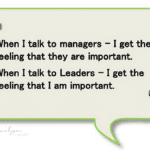(Editor’s Note: In our on-going discussion about the qualities of Leadership, Jennifer V. Miller suggested that we consider more than just likability. My thanks to Jennifer for writing this guest post and adding to the leadership dialogue.)
In the workplace we need to be mindful of the words we use; words can uplift, sooth and encourage. Similarly, they can deflate, irritate and damage the spirit. Mary Jo Asmus and Art Petty posted a collaborative essay on their respective blogs on the importance of the words leaders speak. This led me to consider the words we use to describe important workplace concepts such as leadership.
So when Sharlyn posed the question: “Is being ‘likable’ a key leadership competency?” I felt compelled to chime in. I replied:
I, too, have followed this notion through the blogosphere over the past few weeks. As a leadership competency, there are many words I’d choose above “kindness”. There’s a book called “Leading with Kindness” that seems to be prompting some of the buzz. I haven’t read the book; perhaps it’s fantastic and filled with amazing insights. It just seems to me that the word “kindness” was put on the front cover to get people to crack open the book.
Attributes that are relevant are things like compassion, empathy and emotional resilience. These are key leadership competencies that are in the “touchy feely” realm, yet are true differentiators in the leadership skill set. I’d put those in front of anything that connotes “niceness” or “kindness”.
There are many leadership competency models out there, ranging in size from 6 global competencies to 67 sub-level competencies. When I wrote this reply, I was thinking of attributes/competencies that had a similar “people-skills” theme to them, but weren’t exactly based on niceness. To me, “niceness” in particular has a certain frailty to it. Being “nice” is fine when we’re all in Happy Land, but I’m not sure it serves well when the going gets tough. Here’s why I think the following leadership traits have better staying power.
Empathy and Compassion. Empathy is about being able to see someone else’s perspective and compassion is about wanting to do something about another’s situation. These two traits go hand-in-hand for leaders needing to help an employee through a trying situation. A leader who is being “kind” may shy away from pointing out difficult-to-discuss aspects of the situation, thinking he/she is somehow protecting the employee. In my mind, a skilled leader can be empathetic and compassionate, yet still leave the responsibility where it belongs—with the employee.
Emotional Resilience. Let’s face it, being a leader is tough in the best of economic times and can be downright rotten in a tough business climate. It takes emotional resilience to have those crucial conversations with employees—to hear about the challenges going on in their home life, to see them struggle with conflicts with fellow employees, or to yet again do a reduction-in-force meeting with a valued employee. Being resilient means being able to regroup after a set-back— to refocus on the most important goals for one’s self and one’s team. Leaders who can listen with empathy and compassion, yet avoid taking on their direct reports’ emotional energy are the ones who will avoid burnout.
Like Sharlyn, I don’t advocate for evilness in a leader. In fact, I advocate for leadership that’s humane—defined as “the quality of possessing compassion or consideration for others.”
The more humane a leader seems, the more approachable employees will perceive him/her to be. And when employees are comfortable engaging their leader, that sets up a perfect environment for the leader to demonstrate those “people skills” chops.
Jennifer V. Miller is thoroughly enjoying her newcomer status as blogger on all things related to the “people equation”. A former HR generalist, training practitioner and training manager, she now consults with clients to build leadership development programs at SkillSource of Western Michigan. Jennifer’s blog is www.jennifervmiller.com.
2







dont compromise says
Interesting as ever! Struck that this is something we addressed to come extent recently too, in response to a piece called 21st Century Leaders at TrainingZone (http://www.trainingzone.co.uk/topic/leadership/what-tomorrows-leaders-need). Our reaction – http://tinyurl.com/mpthy21 – was that empathy was the skill that Andrew Leigh missed. My personal opinion here is that, if your mission is at least in part to inspire others, then the ability to demonstrate your understanding of their situation, challenges and feelings generates more trust (another topic we’ve explored recently). Who do you work hardest for: the leader you feel appreciates your own situation and how much they are asking of you, or the one who doesn’t seem to understand. (I think ‘caring’ is a separate argument: we may be more prepared to forgive a ‘lack of kindness’ where we feel we are at least understood and empathised with.)
ReviewSNAP says
This is a good article and the competencies you mentioned tie back to some attributes that I think create a good leader, which are trust and approachability. You don’t need to be best friends with your employees, but they need to trust your decisions and trust that they can talk to you. This goes along with approachability. They can’t feel intimidated and afraid to bring issues to your or ask you everyday questions. I’m not an advocate of evil leaders either. All that does is hurt the employee’s performance and dedication to their job.
Jennifer V. Miller says
Thanks for joining the conversation! Both of you are calling out the role that trust-building plays in creating strong leader-employee relationships. That’s fodder for yet another blog post, I suppose.
Deirdre says
Key attributes in leaders but too frequently missing. Wonderful post.
Jessica Miller-Merrell says
Great post on leadership, Jennifer. Human leadership is the best attribute to develop relationships, motivate others, and drive results. Engaged employees are far more productive and passionate about their work. A good leader is worth its weight in gold. Well said!
Jessica Miller-Merrell, SPHR
http://www.blogging4jobs.com
@blogging4jobs
Jennifer V. Miller says
Jessica you’ve highlighted the benefits when those attributes are present; Dee you’ve noted the consequences of their absence. Thanks for chiming in!
Peter Lanc says
Great thoughts. I wonder though at the basic level kindness begets the other qualities? Perhaps also we find being “kind” to be an uncomfortable business word. When all is said and done being kind brings out positive qualities. Thanks for the article.
Jennifer V. Miller says
Peter,
Yes, I do find that business people may shy away from the word “kind”. I wonder why? Perhaps they feel it connotes a sort of weakness? From my experience, some of the kindest people I know in my work life are also the toughest, so I’m not sure that kindness necessarily begets weakness.
Dave says
Interesting comments from both Jennifer and Peter. I agree that I see a shrinking from or embarassment at the idea of ‘kindness’ in many people in a business context. In situations where polite ‘feedback’ is acceptable, I’ve once or twice be moved to make a comment about how much kindness can achieve. Given that enhancing acheivements is central to just about every business, it’s saddening that one of the most valuable ways of bring it about is socially tainted for some people.
Peter Lanc says
Lets bring some “real old fashioned words” back like kindness, politeness, gentleness. What other words can you think of. The english language is there for all, not just business. Perhaps thats a culture that we in HR should consider as a focus.
Dave says
I’m quietly smiling to myself at the recent memory of my partner spotting an organisation proudly calling itself ‘Business in the Community’ and commenting “Where the hell else do they think business usually happens? Mars?”. An excellent question, I thought to myself, and one that Peter’s last comment reminded me of rather powerfully!